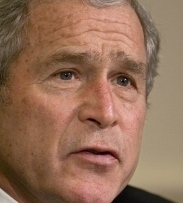Acrimony sown by Bush will forever define his presidencyBy Peter S. Canellos
January 6, 2009

GREAT DIVIDER Instead of acknowledging his mistakes, President Bush chose to fight back against those who pointed them out.
As his presidency enters its final two weeks, George W. Bush is hoping that history will give him high marks on two scores: having prevented another terrorist attack at home - a topic he has said he might address in a farewell speech - and being seen as "somebody who liberated 50 million people," as he put it in a National Public Radio interview. The latter comment reflects his confidence that the failures of his Iraq policy will be lessened if and when a successful democracy emerges.
But Bush has also used a series of postelection interviews to mitigate his standing in two areas where history is unlikely to be kind: his use of intelligence in the run-up to the Iraq war, and the extent to which his actions and the way he defended them divided the country and alienated many US allies.
"I regret saying some things that I shouldn't have said," Bush told CNN, referring to having used the phrase "dead or alive" to describe his manhunt for Osama bin Laden, and saying "bring 'em on" in response to the Iraqi insurgency. The comments made him seem too eager to fight, he said.
.....
The utter confidence with which he declared in his 2003 State of the Union address that Iraq had "gone to elaborate lengths, spent enormous sums, taken great risks to build and keep weapons of mass destruction," will be weighed against the more measured assessments of some CIA analysts, United Nations inspectors, and other world leaders. His assertion in the same speech that Hussein harbored Al Qaeda was emphatically disputed then as now.
But instead of acknowledging his mistakes, Bush chose to fight back against those who pointed them out, suggesting any questioners were being disloyal to American troops. By making his war a test of patriotism itself, with the blood of soldiers in the balance, he split the country in the most acrimonious way possible, sending ripples of anger into practically every home in America. He broke friendships and divided communities, amid a fog of assertions that kept the real Iraq picture unclear while serving his political purposes.
The acrimony under the surface of Bush's America after 2003 will be visible to history in every film clip, newspaper article, radio transcript, and blog. And the ultimate anger may well be directed at Bush himself.
History will not be George W. Bush's mistress.